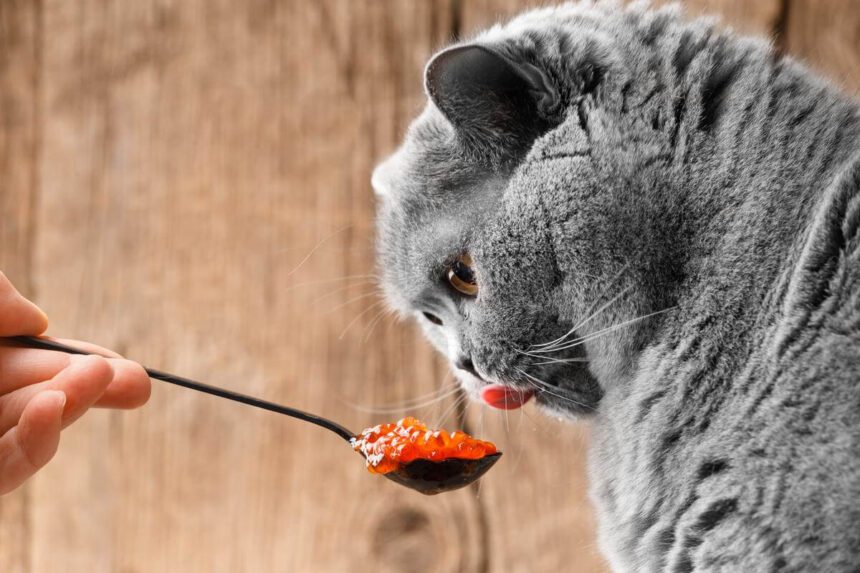Caviar, the exquisite delicacy of fish eggs, has long been associated with luxury and gourmet cuisine. As cat owners, it’s only natural to wonder whether our feline friends can partake in this lavish treat. While cats have specific dietary requirements, it’s essential to explore the potential benefits and risks before considering offering caviar to your beloved pet. In this article, we will delve into the topic and provide an informed perspective on whether cats can eat caviar.
Caviar Composition and Nutritional Value
Caviar is traditionally derived from sturgeon fish eggs, and it is renowned for its rich taste and texture. It is a good source of protein, omega-3 fatty acids, and essential vitamins and minerals. The nutritional content of caviar can vary depending on the species and preparation methods. However, it generally offers a high concentration of nutrients that could potentially benefit feline health.
Benefits of Caviar for Cats
The omega-3 fatty acids found in caviar, such as EPA and DHA, play a vital role in maintaining overall health, including supporting brain function, reducing inflammation, and promoting a healthy coat and skin. These fatty acids are essential for cats, as they cannot synthesize them efficiently in their own bodies. Caviar also contains essential amino acids, which contribute to muscle development and maintenance.
Can cats eat caviar?
In moderation and with certain precautions, cats can consume caviar. However, it should be considered an occasional treat rather than a regular part of their diet.
Moderation and Portion Control
While caviar can offer some nutritional benefits to cats, it is important to exercise caution and moderation. Due to its high salt content, excessive consumption of caviar can lead to health issues, including electrolyte imbalances and dehydration. Cats are generally prone to developing urinary tract problems, so a high-sodium diet can exacerbate these issues. Therefore, caviar should be considered an occasional treat, rather than a regular part of a cat’s diet.
Considerations and Precautions
Before introducing caviar to your cat’s diet, there are a few considerations to keep in mind:
- Quality: Ensure that the caviar you offer to your cat is fresh, free from preservatives, and of high quality. Low-quality or spoiled caviar can pose health risks.
- Allergies: Some cats may have allergies or sensitivities to fish products, including caviar. Monitor your cat closely for any signs of adverse reactions, such as gastrointestinal upset, itching, or respiratory distress.
- Mercury Content: As with any fish product, caviar may contain trace amounts of mercury. Mercury accumulation can be harmful to cats, especially if consumed regularly or in large quantities. It is advisable to limit the amount of caviar your cat consumes to minimize the risk of mercury toxicity.
- Other Options: If you are seeking to provide your cat with omega-3 fatty acids and other essential nutrients, there are safer alternatives available. Consult with your veterinarian for suitable fish-based supplements or specialized cat foods that meet your cat’s dietary requirements.
FAQ
What are the nutritional benefits of caviar for cats?
Caviar is a good source of protein, omega-3 fatty acids, and essential vitamins and minerals. These nutrients can support brain function, reduce inflammation, and contribute to a healthy coat and skin.
Are there any risks associated with feeding caviar to cats?
Yes, there are some risks. Caviar contains a high amount of salt, which can lead to electrolyte imbalances and dehydration if consumed excessively. Additionally, there may be trace amounts of mercury in caviar, which can be harmful if consumed regularly or in large quantities.
cat for any signs of adverse reactions, such as gastrointestinal upset, itching, or respiratory distress.
How should caviar be served to cats?
If you choose to offer caviar to your cat, ensure it is fresh, of high quality, and free from preservatives. It’s best to serve small portions as an occasional treat and not as a substitute for a balanced cat diet.
Are there alternative sources of omega-3 fatty acids for cats?
Yes, there are safer alternatives to caviar for providing omega-3 fatty acids to cats. Consult with your veterinarian for fish-based supplements or specialized cat foods that meet your cat’s dietary requirements.
Can caviar be harmful to cats with urinary tract problems?
Yes, caviar’s high sodium content can potentially exacerbate urinary tract problems in cats. It is advisable to limit the amount of caviar consumed by cats with such conditions.
What should I do if my cat consumes too much caviar?
If you suspect your cat has consumed an excessive amount of caviar or is showing signs of illness, it is best to consult your veterinarian for guidance and appropriate treatment.
Can I feed any type of caviar to my cat?
It is generally recommended to stick with traditional caviar derived from sturgeon fish eggs. Other types of fish roe, such as salmon or trout roe, may have different nutritional profiles and potential risks. Stick to high-quality, properly sourced caviar for cats.
How often can I give caviar to my cat?
Caviar should be given as an occasional treat, and the frequency of offering it to your cat should be limited. It is best to consult with your veterinarian to determine an appropriate frequency based on your cat’s specific dietary needs and health condition.
Can kittens eat caviar?
It is generally not recommended to introduce caviar to kittens. Kittens have specific dietary requirements for growth and development, and their digestive systems may not be fully equipped to handle caviar. It is best to focus on a balanced kitten-specific diet recommended by your veterinarian.
Is there a risk of foodborne illnesses from caviar?
Like any raw or minimally processed food, there is a potential risk of foodborne illnesses associated with caviar. To minimize the risk, ensure that the caviar is fresh, properly handled, and sourced from reputable suppliers who follow strict food safety standards.
Can cats become addicted to caviar?
Cats can develop preferences for certain flavors and textures, but addiction to caviar specifically is unlikely. It’s important to offer a variety of balanced foods to ensure a well-rounded diet and prevent dependency on specific treats or flavors.
Can I make homemade caviar for my cat?
Homemade caviar preparations may not provide the same nutritional benefits or meet the necessary safety standards as commercially available caviar. It is best to consult with your veterinarian for suitable options and to ensure your cat’s health and well-being.
Conclusion
Ultimately, while cats can technically consume caviar, it is not recommended as a regular part of their diet. The potential risks, such as high sodium levels and mercury contamination, outweigh the limited nutritional benefits it may offer. Instead, it is advisable to focus on providing your cat with a balanced and nutritionally complete diet that is specifically designed to meet their needs.
In conclusion, while it may be tempting to share luxurious treats like caviar with our cats, it is important to prioritize their dietary needs and overall health. Stick to cat-specific treats and well-balanced cat food to provide the necessary nutrients without compromising their well-being. Remember, a happy and healthy cat is the ultimate luxury!



